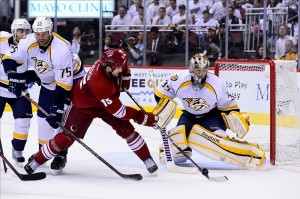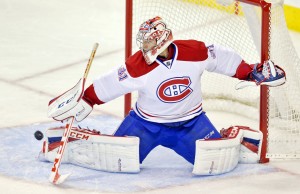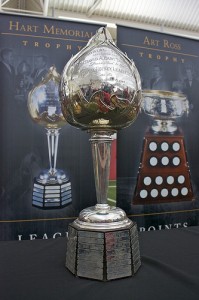Largely thanks to the market that is Montreal, Carey Price is being touted by many as a Hart and Vezina Trophy favorite. The hockey media of the day has all but anointed Price, which with so many games left in the regular season is somewhat telling if not surprising. Relegated to the back burner in this debate is Pekka Rinne, sidelined for eight games with a minor lower body ailment. The Feb. 17, 2015 game against the San Jose Sharks reinforced that despite a mild gap in GAA and Save Percentage, Rinne should be in the conversation as an equal for at least one of these awards, regardless of whether he plays in a Canadian (Canadien?) hockey Mecca.
Rinne’s Injury Should Not Be a Factor
Injuries are a fact of life in sports. For an athletic, Gumby-like goalie like Rinne, one might assume his risk is even higher. With fewer minutes played comes fewer shots against and, as we’ve seen in seasons’ past, playing too few games is a mark against Vezina voting. Rinne however will, if current trends continue, be among the League leaders in games and minutes played. He will also finish among the leaders in wins — the “important” stat — a testament to his quality of play regardless of time missed. In fact, even despite Rinne’s injury, he was ahead of Price in wins. Price tends to remain durable and available, a testament to his controlled, clinical style that remains remarkably consistent if not all that thrilling to watch. Price supporters will point to games played and resulting higher shots against as a direct correlation to increased quality scoring opportunities, which is accurate if not true.

Price Faces More Shots, Helping Him Statistically
Fans that have watched hockey for more than a couple seasons understand that shot quantity doesn’t always mean too much. In fact, too few shots are often hindrances to goalies maintaining concentration and staying “in the flow.” Carey Price plays the bulk of his games because, to his credit, outcomes are far more guaranteed with him in net vs. Dustin Tokarski. However, examining shot quality — a metric gaining popularity in fairly evaluating goaltending — indicates that many of these shots are direct results of Rinne’s superior rebound control. Nashville is quite average in terms of shot suppression, but Rinne is well-known for gloving pucks most guys would have bounce off their pads, suppressing second and third threats. By creating extra chances for opposing forwards, Price — like Toronto’s James Reimer and Jonathan Bernier — tend to inadvertently increase their shots against and, as an offshoot, their save percentages. To Price’s credit, his numbers haven’t suffered as a result, but by not offering offenses extra chances Rinne’s numbers actually work against him in direct comparisons to Price’s (SportingCharts.com has excellent breakdowns between players).

The NHL Remains Largely Old School
Very few teams employ analytics as an official function. In fact, many GMs still feel that the eye test means more. This is where, even if one could create an overwhelming statistical case for Carey Price winning the Hart, Vezina or both over Rinne, many of those metrics will be ignored. In fact, only two teams jump out as embracing (or beginning to embrace) moneyball-style measuring — Toronto and St. Louis. Where Price holds an advantage is one that as old as the League itself — a preference in major award voting toward major market, Original Six and yes, Canadian teams. Like Henrik Lundqvist winning the Vezina a few years back over arguably equal candidates, there can be little question that the sentiment was it was “his turn” after many nominations and no wins. In Price, we have a young, popular goaltender in perhaps hockey’s biggest market, where sentiment and a sense of entitlement runs high. Added to this is the “Ryan Miller effect”, where a player’s recent Olympic performance is inappropriately added to the decision making process for an NHL award. This is not to diminish Price’s efforts in the 2014-2015 season; rather, to serve as a reminder that these choices are not made from an objective, purely numbers-based perspective as many would have us believe.

Price Versus Rinne is Largely Semantic
An honest case can be made for NHL goaltending supremacy for both Price and Rinne. With two top-notch stars, one in each Conference and playing very different styles, fans have a chance every night to witness highlight-reel play. However, it’s a bit early to determine which of these men should win which award, since we don’t have a grasp on the season’s outcome and their final numbers. Regardless, fans of hockey in general should be happy to have an abundance of riches and a fun, impassioned debate over minute differences in world-class goaltending.
Not to mention that contrary to what you mentioned about his rebound control, he handles them very well. Most of the rebounds he gives up are controlled and angled out of harms way. He is pulling away from Rinne in goals against, is #1 in wins, #1 in save percentage and has twice as many shutouts than Rinne does. The fact that you mention Price in the same breath as Reimer and Bernier, shows that you have absolutely no clue what you are talking about. Of course he is the “annointed one” in Montreal, but just think of the mass hysteria that would be going around if Bernier was having a similar year for Toronto. Rinne deserves a lot of credit for what he is done, however everyone should start admitting that Price is pulling away from him a little more with every game that goes by.
Wow David, you must really be a Leafs fan. I moved to the G.T.A from Montreal and I can guarantee you that Price is not mentioned that much around here. So your argument about the media putting him in line to win the Vezina and Hart is completely inaccurate. Watch him play a few games and you will understand why he is currently the best goaltender in the game. Rinne is great, however he has a much better team in front of him as well. You forget to mention that as well.
At the end of the day it’s pretty simple, look at Price’s last 25 games and what he is currently doing… Rinne is great and should be a consideration for the Vezina, but for the Hart on a low scoring Canadien’s team, it’s Price.
You have removed comments criticizing your text? This is the most unprofessional, shameful and disrespectful act I have ever seen in any sports blog / media. I have a screenshot of the pre-edit post-edit page, with the comments and your removal of the comment. I will hope that this is indeed a mistake, but I hope you understand that this is something that must be brought to social media.
Your lack of professionalism, and respect for the readers is appalling I can only hope that your supervisors / editorial chief(s) is / are not aware of that fact. Opinions must be debated, it is only healthy. For one to remove the comments of his reader, is not only condescending, but disturbing for we live in a free society, and for none of the comments were offensive or out of place.
Where there is no freedom to criticize, there can be no honest praise.
Sincerely,
An offender reader.
PS: Should you refuse to address the issue, you can expect the issue to reach the meanders of Twitter
John – perhaps you should get some facts before going off on us. We updated our commenting system, moving to the Disqus system as we think it is a better experience for our readers. Our database of old comments was huge and not all were imported properly.
We regretfully lost some comments but it was not intentional.
I had logged in with my Disqus Account when I first commented, with my original name (the John Fargo being a guest log-in) therefore I am everything but convinced that you are indeed saying the truth.
If this is a result of the Disqus system move, then how come my deleted comment was posted with my Disqus account? The activity track function on my account proves it.
Digging harder it seems…
I think at least 3 individuals pointed out serious flaws in your reasoning i.e. the question of offensive support, the quality of the defence, and the omission of other important variable. Yet, you have failed, or refused, to recognize these as legitimate claims, which I find deplorable.
If you are a goaltender, in a team that scores about 3 goals per game, versus a team that can barely put more than 2 a game, you will have less pressure to win, and, more importantly, your team will be able to take some of the pressure in your opponent’s defensive area.
To bring an interesting statistitc, let’s include the PK%. A Penalty Kill will most likely be one of the only situation in which Rinne and Price can be expected to spend a similar amount of time under heavy offensive pressure. According to this stat, Carey Price is superior to Rinne in PK situations, but you wouldn’t go that far in your analysis right? That could very well ruin your entire argument.
Additionally, as someone pointed out, defensively speaking, Nashville has a stronger Defence Core than Montreal, and Price is usually the sole reason why Montreal wins games. A very good example of that was his injury during the previous series. When he got injured, the only reason why the Canadiens had a chance, was because Tokarski played some exceptional hockey, not because the defence stepped up, not because the forwards started scoring, but simply because Tokarski showed us exceptional goaltending.
Now I respect your point of view, your support for a team, etc, but your article transpires bias. If you want to bring facts, statistics and other variables, you must use them all (as long as it remains reasonable) otherwise your methodology will be flawed.
Anyway, they’re both great goaltenders, and I’ve had that debate many times among friends and coworkers, but at the end of the day, Carey Price is carrying his team 9 out of 10 games. He is becoming, or has become (I have a lot of respect for Lunqvist and Luongo who are sitll in the league) the NHL’s top goaltender, and that means no matter where you put him, he will perform, no matter the situation. He blanked his way to a Gold Medal, let us not forget.
Cheers.
Genius,
You do know that scoring lots of goals tends to help in that win category. Nashville 6th in the league. Montreal 23rd.
If you dont know this, you should have all writing implements taken from you. Assuming you do know this, leaving it out I’d disingenuous and you should have all writing implements taken from you. So it’s decided then. No more writing for you.
Poorly constructed argument. You have completely excluded the goal support that Rinne gets to get those “important” wins. Nashville is 6th in Goals per Game Played (2.98 G/GP). Montreal is Bottom 10 (23rd in fact with 2.23 G/GP). Wonder how many wins Rinne would have, if Nashville got as many goals as MOntreal?
And regarding the shot quality argument – please do not draw the wrong inferences from statistics. The link you provided (http://i.imgur.com/t2dbjOL.jpg) just shows that Carey Price gets a lot of shots in the paint. Montreal D is poor at clearing the crease and gives up a lot of shots from up close which is far harder to stop. Nothing in that graph talks about better versus poor rebound control. So lets not throw conclusions that are supported by the eye test that you yourself criticize.
I think Rinne is a candidate for Vezina and there is a lot of the season left. And I agree that Rinne’s injury shouldnt count against him. But your arguments are flawed
The graph is a visual aid. Those of us that know players and the game discuss that, rather than debate club rules of engagement.
What a complete and utter joke. I wish I could just dismiss this as Bias, but this is more than that. It is Stupidity.
1. If very D Man on Nashville was traded for every D Man on Montreal who wins that Trade? That Reality never factored into your article huh?
2. Montreal possess the puck less than Nashville and gives up more shots, but that means Nashvilles Goaltender is actually better? Is that what you are saying? I hope not…..
3. An expansion team crying about Original 6 Bias. Man you are Original.
4. Montreal Fans wish Prices Injury would not have been a Factor Last year.
I find this quite interesting that a Nashville contributor is saying not so fast in anointing Price. Bias much?
So it’s OK at this stage with the race so close to go ahead and do so? As a Nashville (and St. Louis, for the record) contributor, it’s incumbent upon me to include Nashville content. As it turns out, Rinne is neck and neck by most metrics.
I feel as tho, while yes the stats are neck and neck, you were very nit picky in trying to take apart Price. The Hart and Vezina go to players that our the most valuable to their respective team. They are awards which go to players in which the team would not perform nearly as well without them. If this is the case Price is the sole receiver of this award.